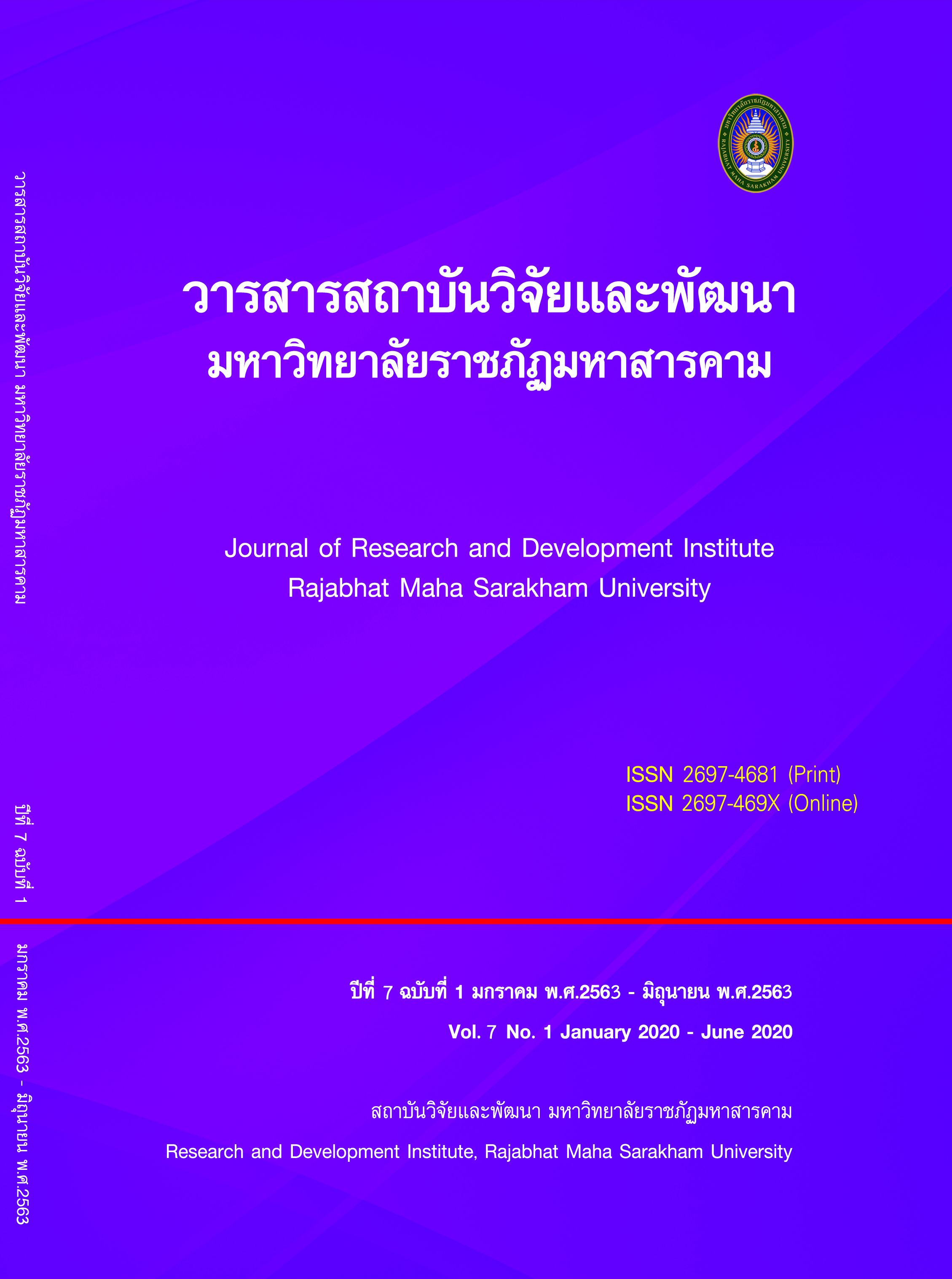Guidelines for Performance Improvement of Teachers under the Secondary Educational Service Area Office 27
Keywords:
Guidelines for Performance Improvement, Teachers, Office of Roi-Et Secondary Education Service Area 27Abstract
The objectives of the research were study: 1) The Current State and Regarding the Desirable State of Teachers’ Performance under Office the Office of Roi-Et Secondary Education Service Area 27 and 2) Guidelines to Develop Teachers’ Performance in Office the Office of Roi-Et Secondary Education Service Area 27. The Research Were Divided Into 2 Phases. In Phase 1, To Study the Current State and Regarding the Desirable State of Teachers’ Performance, The Sample Comprised 265 Personnel Working in School. The Research Instrument Was A Rating Scale Questionnaire, With the Discrimination Power Ranging From 0.28-0.76 The Total Reliability of 0.98. The Data Analysis was to Find Percentage, The Mean and Standard Deviation. In Phase 2 To study Guidelines to Develop Teachers’ Performance Office the Office of Roi-Et Secondary Education Service Area 27, The Purpose were 14 Informants. The Instrument was a Structured Interview Form. The Descriptive Data Analysis Employed Interpretation and Conclusion Making.
The Results were as follows as: 1) The actual condition and the expected condition of the teacher's performance showed that the operating condition was moderate. The average order of descending order is as follows. The teaching and learning. 1.1) The expected condition of the teacher's performance. Under the Office of Roi Et Secondary Education Area 27 overall had the highest level of performance. Sort by average to descending order. 2) Teachers' standard development guidelines for teacher development and good classroom management. Under the Office of Roi Et Secondary Education Area 27, found that 2.1) the self-development and professional teachers. The interviews concluded that the teacher should study the textbooks, attend the academic seminar. Study through the website. Finding the right academic media for learning management. And higher education. This is a good way to develop a professional teacher. The school should have a policy to support professional development teachers. Have a meeting. There is a project to support the development of teachers at least once a week, supervise the teacher development and development reports regularly assess progress. Self-improvement 2.2) Good classroom management the interviews concluded that the school must have sufficient budget for organizing the school environment. Both within the classroom and outside the classroom. Encourage teachers to organize classrooms. To create a class atmosphere that is conducive to learning and fun. The students have a good attitude to study. And to learn effective and full potential. Schools should also be provided with off-campus instruction to facilitate a variety of learning. It provides a variety of learning resources and links to real experiences. 2.3) Instructional Management The interviews concluded that the school had to participate in the planning. Develop the work of the school. Efficient and systematic. The teaching process is focused on the students. Organize activities that encourage students to think and act. To be able to develop fully. Encourage teachers, parents, and communities to collaborate in teaching and learning. Evaluation of learning outcomes. In order to bring the results together to find a solution. Problem solving and behavior modification.
References
References
Kamol Pooprasert. (2002). Academic administration in educational institutions. 2nd edition. Bangkok: Kor. Pol 1996.
Ministry of Education. (1999). National Education Act, 1999. Bangkok: Siam Sports Syndicate.
Ministry of Education. (2002). National Education Act B.E. 1999 (No. 2) and Amendment, 2002. Bangkok: Siam Sports Syndicate.
Professional Standards Committee. (2013). Regulations of the Teachers Council of Thailand on Professional Standards and Ethics of Profession, 2005. Bangkok: Professional Standards Committee.
Tisana Khammani. (2007). 14 teaching methods for professional teachers. Bangkok: Chulalongkorn University.
Phatsakorn Cherdpanich. (2018). Guidelines for teacher performance development, Kantharawichai District, Maha Sarakham Primary Educational Service Area Office 1. Master of Education Thesis: Rajabhat Mahasarakham University.
Sonthaya Phimphan. (2013). Performance of Teacher Professional Standards of Teachers in Secondary School, Takuapa District, Phang Nga Province. Master of Education Thesis : Suan Dusit Rajabhat University. ...
Maha Sarakham Primary Educational Service Area Office 1. (2017). Basic Education Development Plan 2015-2018. Mahasarakham: Policy and Planning Group.
Roi Et Secondary Educational Service Area Office 27. (2017). Basic Education Development Plan, 2015-2018. Mahasarakham: Policy and Planning Group.
Educational Service Area Office Roi Et Secondary Educational Service Area Office 27. (2018). Number of personnel under the Office of Educational Service Area, Roi Et Secondary Educational Service Area Office 27. [Online] http://www.secondary27.go.th/main/# [21 January 2018]
Sirilak Duangdej. (2009). Practice according to professional standards of school administrators, Mae Jam District, Chiang Mai Province. Master of Education (Educational Administration): Chiang Mai University.
Annop Jeenawathana and Ratana Daungkaew. (2015). “A study of the condition of practice in accordance with the work standard and the practice standard of educational professional practitioners.”. STOU Educational Journal, Sukhothai Thammathirat Open University. 8 (2): 44.
Downloads
Published
How to Cite
Issue
Section
License
Articles that are published are copyrighted by the authors of the articles







